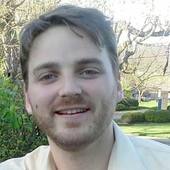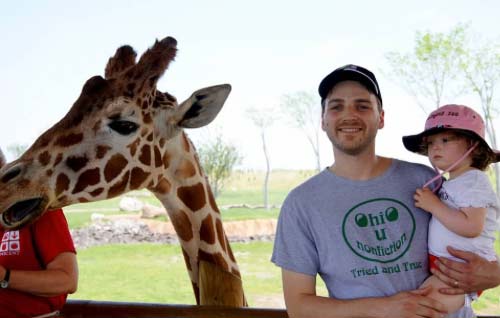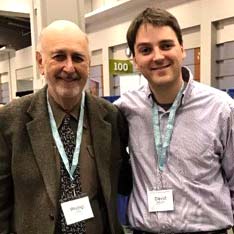ABOUT

I am a nonfiction writer (Beep: Inside the Unseen World of Baseball for the Blind) and literary journal editor (New Ohio Review), and I have taught English at Ohio University for the last 13 years. After studying at Holy Cross, I got my Masters in Poetry and Ph.D. in Creative Nonfiction at OU in Athens, where I continue to live with my wife Megan, my daughter, Natalie, my son, Benjamin, and the family heirloom—an autographed Pedro Martinez hat.
I’ve published somewhat widely, with poems in a dozen journals and essays in another half-dozen, and a couple scholarly articles about British fiction. In 2009, I began writing about unorthodox sports, which led to pieces in Salon, Slate, and theclassical.org, and eventually brought me in contact with Beep Baseball, or baseball for the blind. In 2012, I watched my first Beep Baseball game, and I have followed the National Beep Baseball Association consistently ever since, reporting on the annual World Series and on the ups and downs of blind ballplayers for the Boston Globe Magazine, Texas Monthly, and Hobart. Some of the players came to call me “Book Dave,” and I’m happy to have that book, after quite a few years of revision, forthcoming from Ohio University’s Swallow Press. Growing up in Western Massachusetts, I was a natural and diehard Red Sox fan, and I fancied myself a great young prospect. One Saturday morning, though, I gave up 27 runs in an inning, and (very slowly) I came to recognize that my future in sports was going to depend on a pen rather than a bat. While following Beep Baseball, I found that what I’m really interested in is the underdog story, and the search for unexpected, uncanny glory. While I covered those topics—once speaking about them on Taiwanese radio—I eventually realized that my obsessive interest in the sport was a way for me to think about the rigors of young parenthood, too, and about the role impracticality can play, and maybe needs to play, in my life. Through my interviews with approximately 100 participants, and my travels to three countries to meet Beep Ballers, I developed a rapport with the players and sought only to tell an engaging story about them that refused to pigeonhole or patronize. |
Education
Awards
Positions
Courses Taught at Ohio University
Selected Conference Papers
|
TEACHINGOver the past 13 years, I’ve taught a bunch of different English courses—freshman and junior composition, women in writing, introductions to both poetry and fiction, and the form and theory of nonfiction. But I have primarily been a nonfiction workshop facilitator.
In that role, I remember the searing and possibly self-effacing question of Michel de Montaigne’s: What do I know? It's the essayist's question, and I, hopefully humbly, ask my students what they know and how they can make their memories into art. How can they begin in one place and end in another, surprising themselves as they go? How can they express their opinions/dreams/embarrassments/humor(s) while at the same time exploring how it is that the mind comes to these insights? We study the work of legendary and contemporary essayists to help us answer those questions and to become more deliberate writers. We might focus first on an assignment about the senses, then on tone or persona, then on writing the kid-mind , then on exuberance of style. And we discuss our own writing in a supportive but constructively critical classroom in which we always point out the good and the what-could-be-better. Besides my usual availability in conferences and my extensive notes to them, I can only offer what I've learned as a creative and critical writer myself. We talk about honesty, specificity, revision, revision, tone, humor, revision. The best way for me to teach my students is by showing them that writing is often about not knowing for sure, about weighing old and new ideas, about enlivening our nostalgia with a little hair-pulling effort. To write a really good essay, they need to be productively mixed-up, on at least a couple different occasions. In workshops, I'm amazed by bursts from students who have so much natural talent. But my hardest days come when they think they can't write their lives anymore, that what they've stumbled on—divorces, alcoholism, religious doubt—is too painful. I don’t always nail those days, but I’ve realized they’re mostly about paying attention. “What else [is] being a teacher,” wrote Phillip Lopate, “but trying to respond as humanly as possible to problems that [will] not wait for an expert.” To keep my students' voices central, I offer wide-ranging assignments: along with those mentioned above, we try our hand at critical papers, they write experimental prose and lyric essays, and I usually institute a class blog to expand the classroom space and to allow talk-back and divergent opinions. Class participation amounts to 30% of the grade, and I look to the students to lead discussions and give presentations on relevant essayists. In that way, they further develop the confidence to argue and question, to be active literary citizens. “Try to stay awake,” wrote David Foster Wallace, and it’s my goal to be their educational caffeine. |
The trick is to realize that one is not important, except insofar as one's example can serve to elucidate a more widespread human trait and make readers feel a little less lonely and freakish. — Phillip Lopate |

